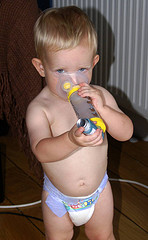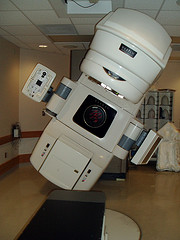Posted on 25 May 2011. Tags: antibiotic resistant bacteria, college of medicine, doctors, dr ian, likelihood, medical magazine, medicine, pediatrics, researcher, use of antibiotics
 A current study found that close to a million children in the United States are prescribed with antibiotics for asthma even though the actual guidelines do not recommend its use. Dr. Ian Paul, the lead researcher and a professor of pediatrics at the Pennsylvania State University College of Medicine, said that they try really hard not to prescribe unnecessary antibiotics but their study shows that pediatricians are prescribing the drug too often.
A current study found that close to a million children in the United States are prescribed with antibiotics for asthma even though the actual guidelines do not recommend its use. Dr. Ian Paul, the lead researcher and a professor of pediatrics at the Pennsylvania State University College of Medicine, said that they try really hard not to prescribe unnecessary antibiotics but their study shows that pediatricians are prescribing the drug too often.
Paul said that it is unclear why doctors prescribe antibiotics to treat severe asthma. He, however, said that doctors may feel that they need to cover all bases and also prescribe antibiotics. There are also times when parents themselves ask their doctors for antibiotics.
The one finding that Paul thought to be encouraging is that education regarding asthma plays an important role in the prescription antibiotics. It appears that when astham education was delivered during the visit, antibiotics are only prescribed 11% of the time; in comparison to 19% when asthma education is not given.
Paul further said that this means we can decrease the likelihood of the use of antibiotics in treating asthma by educating families and patients.
In addition, the doctor said that most antibiotics have side effects and patients may develop antibiotic-resistant bacteria which are life threatening. That is why unnecessary prescription of antibiotics is definitely discouraged.
This report was published on “Pediatrics” on the 23rd of May. Pediatrics is an online medical magazine.
Posted in Health
Posted on 30 March 2011. Tags: cancer patients, cancer type, kinds of cancer, likelihood, lung cancer, national cancer institute, oncology, radiation treatment, researcher, secondary cancer
 A study conducted by the US National Cancer Institute confirms that the likelihood of developing a second cancer after radiation therapy is very low. The long-term study of about 600,000 cancer survivors showed that only 8 per cent of that population developed secondary cancer due to radiation therapy.
A study conducted by the US National Cancer Institute confirms that the likelihood of developing a second cancer after radiation therapy is very low. The long-term study of about 600,000 cancer survivors showed that only 8 per cent of that population developed secondary cancer due to radiation therapy.
The researchers said that among many others, lifestyle and genetic risks are the ones that would likely pre-empt a second cancer.
Amy Berrington de Gonzales, lead researcher, said that the result of the study is a very powerful tool physicians may use to device a treatment plan for their patients. She further said that patients can now be assured that the benefits of undergoing radiation therapy outweigh its risks.
This is the first ever study that was able to quantify the risks that radiation treatment may cause. It was published 30th of March online on The Lancet Oncology.
The research was conducted for 30 years on many different kinds of cancer. Among them are prostate, breast, brain, cervical, and lung cancer. Researchers noticed that development of lung cancer also vary from one cancer type to another. For example, they noticed that it is more predominant among breast and cervical cancer patients.
Elizabeth Ward acknowledges the fact that radiation therapy post risks towards cancer patients. However, she is firm on saying that the benefits outweigh the risks. She also said that thanks to recent technology, we are now more successful on preserving healthy cells during radiation therapy.
Posted in Health
Posted on 10 October 2010. Tags: 6 million, air pollution, cardiovascular risks, decibels, heart attack, home insulation, mortality study, researcher, risk of heart attack, university of bern
 Researchers found that among 4.6 million adults living in Switzerland, heart attacks are more common among people who are exposed to too much aircraft noise. People living under flight routes are the most predisposed.
Researchers found that among 4.6 million adults living in Switzerland, heart attacks are more common among people who are exposed to too much aircraft noise. People living under flight routes are the most predisposed.
According to Matthias Egger, researcher from the University of Bern, the case was much more evident among people who were exposed to increased levels of noise, but it was dependent on for how long those people were exposed to such noise.
Although this is not the first time that noise pollution was linked to undesirable health effects, the study helped determine that the noise is the major cause of the cardiovascular risks and not just other factors that might affect the people such as air pollution.
The researchers identified 15,532 heart attack deaths between late 2000 and end of 2005 among 4.6 million residents. Using this information from the ongoing Swiss mortality study, as well as the government records and environmental data, Egger and his colleagues identified that both the duration and level of aircraft noise affect the people most.
In their written report in journal Epidemiology, the researchers said that people who are exposed at a minimum of 60 decibels of noise at a daily rate are at 30 percent greater risk to die from heart attack than those who are exposed to less than 45 decibels.
On the other hand, people exposed to increased levels of decibels for at least 15 years and more puts up their risk to more than 50 percent.
Egger said that noise does possibly have effects on health and their group recommends further measures to protect the people from such aircraft noise such as sound barriers and better home insulation.
Posted in Health
 A current study found that close to a million children in the United States are prescribed with antibiotics for asthma even though the actual guidelines do not recommend its use. Dr. Ian Paul, the lead researcher and a professor of pediatrics at the Pennsylvania State University College of Medicine, said that they try really hard not to prescribe unnecessary antibiotics but their study shows that pediatricians are prescribing the drug too often.
A current study found that close to a million children in the United States are prescribed with antibiotics for asthma even though the actual guidelines do not recommend its use. Dr. Ian Paul, the lead researcher and a professor of pediatrics at the Pennsylvania State University College of Medicine, said that they try really hard not to prescribe unnecessary antibiotics but their study shows that pediatricians are prescribing the drug too often.
 A study conducted by the US National Cancer Institute confirms that the likelihood of developing a second cancer after radiation therapy is very low. The long-term study of about 600,000 cancer survivors showed that only 8 per cent of that population developed secondary cancer due to radiation therapy.
A study conducted by the US National Cancer Institute confirms that the likelihood of developing a second cancer after radiation therapy is very low. The long-term study of about 600,000 cancer survivors showed that only 8 per cent of that population developed secondary cancer due to radiation therapy. Researchers found that among 4.6 million adults living in Switzerland, heart attacks are more common among people who are exposed to too much aircraft noise. People living under flight routes are the most predisposed.
Researchers found that among 4.6 million adults living in Switzerland, heart attacks are more common among people who are exposed to too much aircraft noise. People living under flight routes are the most predisposed.